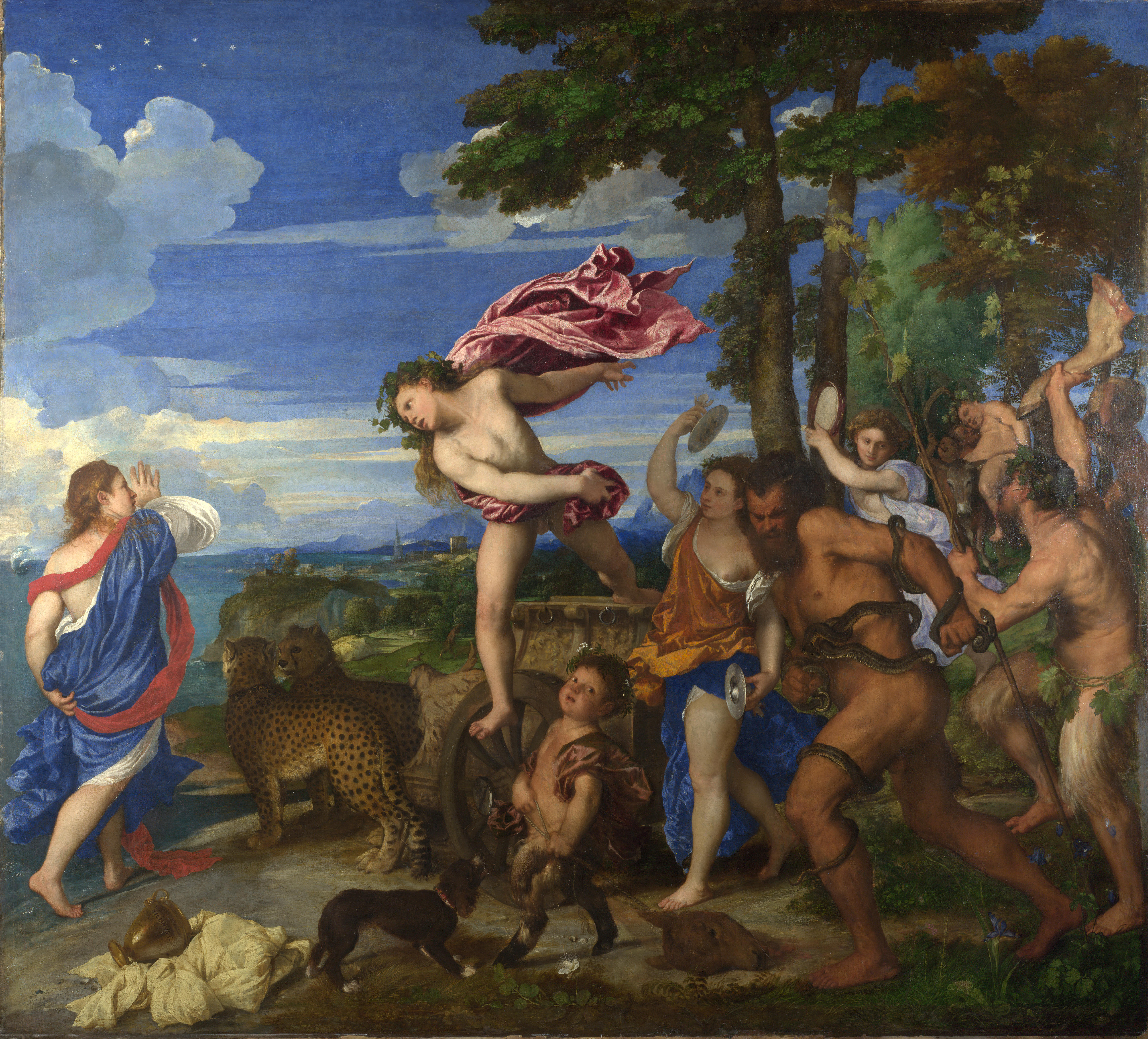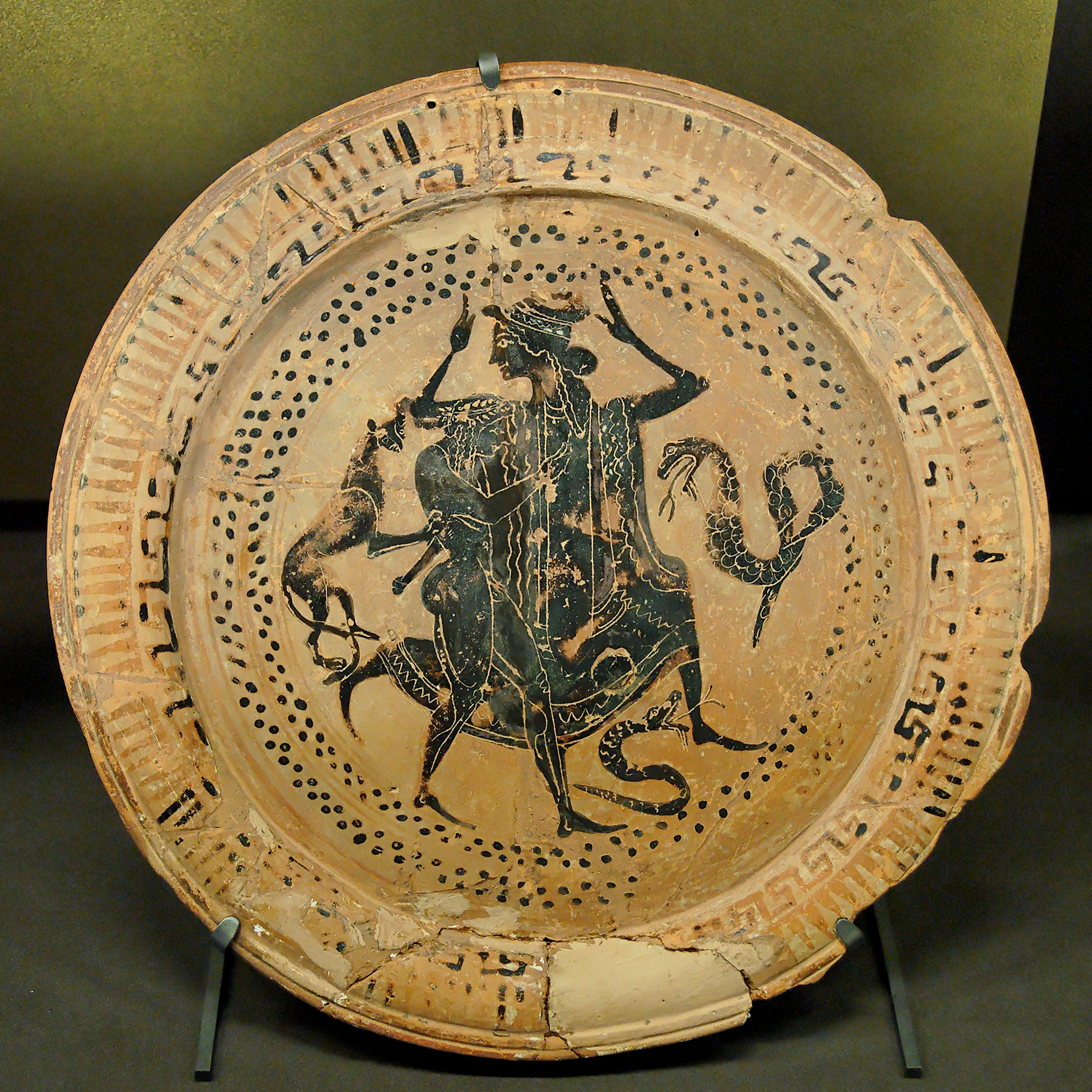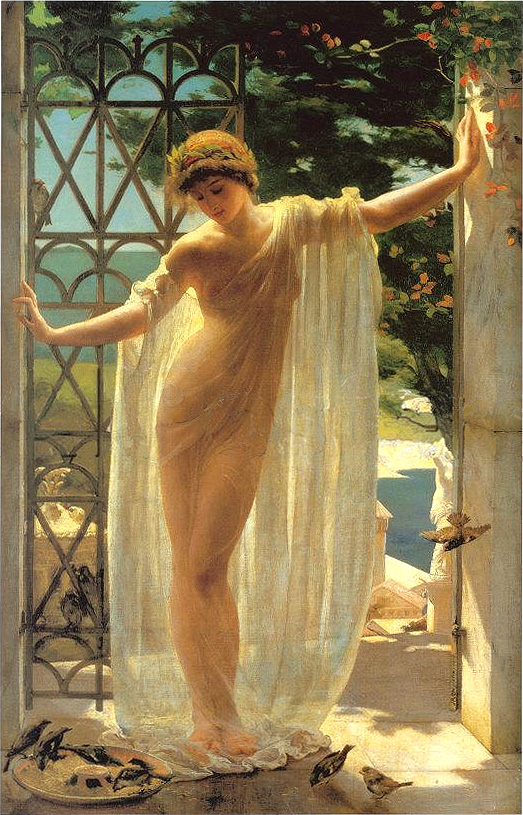|
Epyllion
A sleeping Theseus.html" ;"title="Ariadne's abandonment by Theseus">Ariadne's abandonment by Theseus is the topic of an elaborate ecphrasis in Catullus 64, the most famous extant epyllion. (Roman copy of a 2nd-century BCE Greek original; :it:Villa Corsini a Mezzomonte, Villa Corsini.) In classics, classical studies the term epyllion (Ancient Greek: , plural: , ) refers to a comparatively short narrative poem (or discrete episode within a longer work) that shows formal affinities with epic poetry, epic, but betrays a preoccupation with themes and poetic techniques that are not generally or, at least, primarily characteristic of epic proper. Etymology and modern usage Ancient Greek (''epyllion'') is the diminutive of (''epos'') in that word's senses of "verse" or "epic poem"; Liddell and Scott's '' Greek–English Lexicon'' thus defines as a "versicle, scrap of poetry" or "short epic poem", citing for the latter definition Athenaeus, ''Deipnosophistae'' 2.68 (65a–b): ... [...More Info...] [...Related Items...] OR: [Wikipedia] [Google] [Baidu] |
Georgics
The ''Georgics'' ( ; ) is a poem by Latin poet Virgil, likely published in 29 BCE. As the name suggests (from the Greek language, Greek word , ''geōrgiká'', i.e. "agricultural [things]") the subject of the poem is agriculture; but far from being an example of peaceful rural poetry, it is a work characterized by tensions in both theme and purpose. The ''Georgics'' is considered Virgil's second major work, following his ''Eclogues'' and preceding the ''Aeneid''. The poem draws on a variety of prior sources and has influenced many later authors from antiquity to the present. Description and summary The work consists of 2,188 hexameter, hexametric verses divided into four books. The yearly timings by the rising and setting of particular stars were valid for the precession of the equinoxes, precession epoch of Virgil's time, and so are not always valid now. Book One Virgil begins his poem with a dedication to Gaius Maecenas, Maecenas, then a summary of the four books, followed by ... [...More Info...] [...Related Items...] OR: [Wikipedia] [Google] [Baidu] |
Epic Poetry
In poetry, an epic is a lengthy narrative poem typically about the extraordinary deeds of extraordinary characters who, in dealings with gods or other superhuman forces, gave shape to the mortal universe for their descendants. With regard to oral tradition, epic poems consist of formal speech and are usually learnt word for word, and are contrasted with narratives that consist of everyday speech where the performer has the license to recontextualize the story to a particular audience, often to a younger generation. Influential epics that have shaped Western literature and culture include Homer's ''Iliad'' and '' Odyssey''; Virgil's '' Aeneid''; and the anonymous '' Beowulf'' and '' Epic of Gilgamesh''. The genre has inspired the adjective '' epic'' as well as derivative works in other mediums (such as epic films) that evoke or emulate the characteristics of epics. Etymology The English word ''epic'' comes from Latin , which itself comes from the Ancient Greek adject ... [...More Info...] [...Related Items...] OR: [Wikipedia] [Google] [Baidu] |
Catullus 64
Catullus 64 is an epyllion or "little epic" poem written by Latin poetry, Latin poet Catullus. Catullus' longest poem, it retains his famed linguistic witticisms while employing an appropriately epic tone. Though ostensibly concerning itself with the marriage of Peleus and the sea-nymph Thetis (parents of the famed Greek hero Achilles), a sizeable portion of the poem's lines is devoted to the desertion of Ariadne by the legendary Theseus. Although the poem implies that Theseus and Ariadne were in love, in reality the text never explicitly states that Theseus even looked at Ariadne. Told through ecphrasis, or the depiction of events on inanimate objects, the bulk of the poem details Ariadne's agonized solace. Her impassioned vituperations and eventual discovery by the wine-god Dionysus, Bacchus are some of the included plot events. The poem relies heavily on the theme of nostalgia as Catullus reflects on what he believes are better times in Roman history. He wrote the poem during ... [...More Info...] [...Related Items...] OR: [Wikipedia] [Google] [Baidu] |
Arianna Dormiente, Copia Romana Da Originale Greco Degli Inizi Del II Sec Ac 01
{{disambig ...
Arianna may refer to: * Ariana (name), a given name Opera * ''L'Arianna'', (English: ''Arianna''), by Monteverdi, first performed 1608 * ''Arianna'' (Marcello), by Benedetto Marcello, first concert performance 1727 * ''Arianna in Creta'', by Handel, first performed 1734 * ''Arianna'' (Goehr), by Alexander Goehr, first performed 1995 Other uses * ''Arianna'' (film), 2015 *ARIANNA Experiment, a proposed neutrino detector at the Ross Ice Shelf, Antarctica *Arianna (yacht), a 2012 luxury megayacht See also *Ariana (other) *Ariane (other) *Ariadne (other) *Aria (region), sometimes confused with Ariana *Aryana (TV series) ''Aryana'' is a Philippine television drama fantasy series broadcast by ABS-CBN. Directed by Erick C. Salud, Lino Cayetano, Lino S. Cayetano and Darnel Joy R. Villaflor. it stars Ella Cruz, Francis Magundayao, Paul Salas, Dominic Roque and Miche ... [...More Info...] [...Related Items...] OR: [Wikipedia] [Google] [Baidu] |
Moritz Haupt
Moriz or Moritz Haupt (27 July 1808 – 5 February 1874), was a German philologist. Biography He was born at Zittau, Lusatia, Saxony. His early education was mainly conducted by his father, Ernst Friedrich Haupt, burgomaster of Zittau, a man of learning who took pleasure in translating German hymns or Goethe's poems into Latin, and whose memoranda were employed by Gustav Freytag in his ''Bilder aus der deutschen Vergangenheit''. From the Zittau gymnasium, where he spent the five years 1821–1826, Haupt moved to the University of Leipzig intending to study theology; but his own inclinations and the influence of Professor Gottfried Hermann soon turned him in the direction of classical philology. On the close of his university course (1830) he returned to his father's house, and the next seven years were devoted to study, not only of Greek, Latin and German, but of Old French, Provençal and Czech language">Bohemian. His friendship with Karl Lachmann, formed at Berlin, had great ... [...More Info...] [...Related Items...] OR: [Wikipedia] [Google] [Baidu] |
Ariadne
In Greek mythology, Ariadne (; ; ) was a Cretan princess, the daughter of King Minos of Crete. There are variations of Ariadne's myth, but she is known for helping Theseus escape from the Minotaur and being abandoned by him on the island of Naxos. There, Dionysus saw Ariadne sleeping, fell in love with her, and later married her. Many versions of the myth recount Dionysus throwing Ariadne's jeweled crown into the sky to create a constellation, the Corona Borealis. Ariadne is associated with mazes and labyrinths because of her involvement in the myths of Theseus and the Minotaur. There are also festivals held in Cyprus and Naxos in Ariadne's honor. Etymology Greek lexicographers in the Hellenistic period claimed that ''Ariadne'' is derived from the ancient Cretan dialectical elements ''ari'' (ἀρι-) "most" (which is an intensive prefix) and ''adnós'' (ἀδνός) "holy". Conversely, Stylianos Alexiou has argued that despite the belief being that Ariadne's name is of ... [...More Info...] [...Related Items...] OR: [Wikipedia] [Google] [Baidu] |
Thetis
Thetis ( , or ; ) is a figure from Greek mythology with varying mythological roles. She mainly appears as a sea nymph, a goddess of water, and one of the 50 Nereids, daughters of the ancient sea god Nereus. When described as a Nereid in Classical myths, Thetis was the daughter of Nereus and Doris (Oceanid), Doris, and a granddaughter of Tethys (mythology), Tethys with whom she sometimes shares characteristics. Often she seems to lead the Nereids as they attend to her tasks. Sometimes she also is identified with Metis (mythology), Metis. Some sources argue that she was one of the earliest of deities worshipped in Archaic Greece, the oral traditions and records of which are lost. Only one written record, a fragment, exists attesting to her worship and an early Alcman hymn exists that identifies Thetis as the creator deity, creator of the universe. Worship of Thetis as the goddess is documented to have persisted in some regions by historical writers, such as Pausanias (geograp ... [...More Info...] [...Related Items...] OR: [Wikipedia] [Google] [Baidu] |
Peleus
In Greek mythology, Peleus (; Ancient Greek: Πηλεύς ''Pēleus'') was a hero, king of Phthia, husband of Thetis and the father of their son Achilles. This myth was already known to the hearers of Homer in the late 8th century BC. Biography Peleus was the son of Aeacus, king of the island of Aegina, and Endeïs, the oread of Mount Pelion in Thessaly. He married the sea-nymph Thetis with whom he fathered Achilles. Polymele, a daughter of Peleus, was one of the possible mothers of Patroclus by Menoetius. Peleus and his brother Telamon were friends of Jason and both were counted as Argonauts. Though there were no further kings in Aegina, the kings of Epirus claimed descent from Peleus in the historic period. Mythology Peleus and his brother Telamon killed their half-brother Phocus, perhaps in a hunting accident and certainly in an unthinking moment, and fled Aegina to escape punishment. In Phthia, Peleus was purified by the city's ruler, Eurytion, and then marr ... [...More Info...] [...Related Items...] OR: [Wikipedia] [Google] [Baidu] |
Catullus
Gaius Valerius Catullus (; ), known as Catullus (), was a Latin neoteric poet of the late Roman Republic. His surviving works remain widely read due to their popularity as teaching tools and because of their personal or sexual themes. Life Gāius Valerius Catullus was born to a leading equestrian family of Verona, in Cisalpine Gaul. The social prominence of the Catullus family allowed the father of Gaius Valerius to entertain Julius Caesar when he was the Promagistrate (proconsul) of both Gallic provinces. In a poem, Catullus describes his happy homecoming to the family villa at Sirmio, on Lake Garda, near Verona; he also owned a villa near the resort of Tibur (modern Tivoli). Catullus appears to have spent most of his young adult years in Rome. His friends there included the poets Licinius Calvus and Helvius Cinna, Quintus Hortensius (son of the orator and rival of Cicero), and the biographer Cornelius Nepos, to whom Catullus dedicated a '' libellus'' of poems, the ... [...More Info...] [...Related Items...] OR: [Wikipedia] [Google] [Baidu] |
Aristaeus
Aristaeus (; ''Aristaios'') was the mythological culture hero credited with the discovery of many rural useful arts and handicrafts, including bee-keeping; He was the son of the huntress Cyrene and Apollo. ''Aristaeus'' ("the best") was a cult title in many places: Boeotia, Arcadia, Ceos, Sicily, Sardinia, Thessaly, and Macedonia; consequently a set of "travels" was imposed, connecting his epiphanies in order to account for these widespread manifestations. If Aristaeus was a minor figure at Athens, he was more prominent in Boeotia, where he was "the pastoral Apollo", and was linked to the founding myth of Thebes by marriage with Autonoë, daughter of Cadmus, the founder. Aristaeus may appear as a winged youth in painted Boeotian pottery, similar to representations of the Boreads, spirits of the North Wind. Besides Actaeon and Macris, he also was said to have fathered Charmus and Callicarpus in Sardinia. Pindar's account According to Pindar's ninth Pythian Ode and ... [...More Info...] [...Related Items...] OR: [Wikipedia] [Google] [Baidu] |
Aeneid
The ''Aeneid'' ( ; or ) is a Latin Epic poetry, epic poem that tells the legendary story of Aeneas, a Troy, Trojan who fled the Trojan War#Sack of Troy, fall of Troy and travelled to Italy, where he became the ancestor of the Ancient Rome, Romans. Written by the Roman poet Virgil between 29 and 19 BC, the ''Aeneid'' comprises 9,896 lines in dactylic hexameter. The first six of the poem's twelve books tell the story of Aeneas' wanderings from Troy to Italy, and the poem's second half tells of the Trojans' ultimately victorious war upon the Latins (Italic tribe), Latins, under whose name Aeneas and his Trojan followers are destined to be subsumed. The hero Aeneas was already known to Greco-Roman legend and myth, having been a character in the ''Iliad''. Virgil took the disconnected tales of Aeneas' wanderings, his vague association with the foundation of Ancient Rome, Rome and his description as a personage of no fixed characteristics other than a scrupulous ''pietas'', ... [...More Info...] [...Related Items...] OR: [Wikipedia] [Google] [Baidu] |
Nisus And Euryalus
In Greek and Roman mythology, Nisus () and Euryalus (; ) are lovers serving under Aeneas in the ''Aeneid'', the Augustan epic by Virgil. Their foray among the enemy, narrated in book nine, demonstrates their stealth and prowess as warriors, but ends as a tragedy: the loot Euryalus acquires (a glistening Rutulian helmet) attracts attention, and the two die together. Virgil presents their deaths as a loss of admirable loyalty and valor. They also appear in Book 5, during the funeral games of Anchises, where Virgil takes note of their ''amor pius'', a love that exhibits the ''pietas'' that is Aeneas's own distinguishing virtue. In describing the bonds of devotion between the two men, Virgil draws on conventions of erotic poetry that have suggested a romantic relationship to some, interpreted by scholars in light of the Greek custom of ''paiderastia'', in which their ''amor pius'' possibly also expresses sexual love, comparing their ambiguous relationship to that of Achilles a ... [...More Info...] [...Related Items...] OR: [Wikipedia] [Google] [Baidu] |







